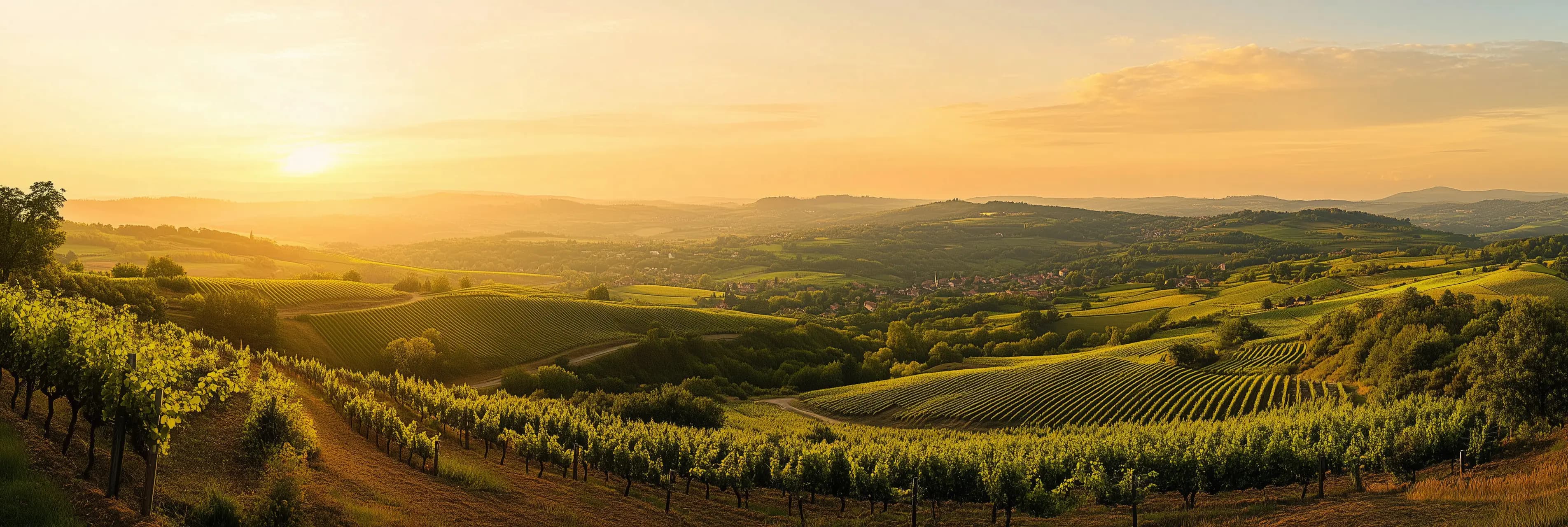Vaux-en-Beaujolais (Clochemerle): the satirical village immortalized by Gabriel Chevallier
Vaux-en-Beaujolais, a charming village nestled in the rolling vineyards of the Beaujolais region, might have remained relatively unknown if not for the satirical novel Clochemerle by Gabriel Chevallier, published in 1934. This humorous and biting critique of French provincial life, centered around a scandal involving a public urinal, brought the village international fame and a lasting literary legacy. But what is the real story behind Vaux-en-Beaujolais? How has the fictional Clochemerle shaped its identity and appeal?
Vaux-en-Beaujolais: a quintessential Beaujolais village
Before being reimagined as Clochemerle, Vaux-en-Beaujolais was like many other villages in the region—rooted in viticulture and defined by its picturesque landscapes.
Located between Villefranche-sur-Saône and Beaujeu, it is surrounded by rolling hills covered in vines that produce elegant Beaujolais Villages wines.
The village’s history has always been intertwined with wine. The Gamay Noir à Jus Blanc, the emblematic grape of the Beaujolais region, thrives in this terroir, producing wines known for their freshness, fruitiness, and light-bodied charm.
But in 1934, the publication of Clochemerle changed everything. The fictional village, with its petty squabbles and exaggerated provincial politics, became a symbol of rural France—and Vaux-en-Beaujolais embraced its literary alter ego.
Clochemerle: the novel that put Vaux-en-Beaujolais on the map
Gabriel Chevallier, a writer with a keen eye for human folly, used Vaux-en-Beaujolais as the inspiration for his novel Clochemerle.
The story revolves around a seemingly trivial controversy: the installation of a public urinal in the village square. This minor event ignites a fierce battle between conservatives and progressives, exposing the absurdities of small-town politics, religious hypocrisy, and social divisions.
The book was an instant success, quickly translated into multiple languages and adapted into films, television series, and even a comic opera. It became one of the most famous French satirical novels of the 20th century.
For Vaux-en-Beaujolais, this newfound literary fame was both an opportunity and a transformation. Instead of distancing itself from the novel, the village fully embraced its Clochemerle identity, turning it into a cultural and touristic attraction.
Visiting Clochemerle: a journey into literary and wine heritage
Today, visitors to Vaux-en-Beaujolais (Clochemerle) can immerse themselves in the world of the novel while enjoying the village’s rich wine culture.
Key attractions:
- The “Clochemerle” square – at the heart of the village, a real-life public urinal, humorously referencing the novel’s plot, stands as a tribute to Chevallier’s satire ;
- The Gabriel Chevallier exhibition – a small museum dedicated to the author and his work, offering insights into the novel’s impact ;
- Themed walking tour – plaques and murals throughout the village illustrate scenes from Clochemerle, allowing visitors to relive the story ;
- Beaujolais wine tasting – several wineries and tasting rooms in Vaux-en-Beaujolais offer the chance to sample excellent Beaujolais Villages wines.
For wine lovers, the visit is an opportunity to explore how the local Gamay grape expresses itself in this specific terroir, with fruity, easy-drinking reds that pair perfectly with local cuisine.
Clochemerle’s legacy in literature and popular culture
The legacy of Clochemerle extends far beyond Beaujolais.
The novel remains a reference in French satire, often compared to the works of Marcel Pagnol or René Goscinny (Asterix) for its sharp yet affectionate portrayal of rural life.
The book’s international success also led to a BBC television adaptation in 1972, bringing the tale to British audiences. The series, a witty and colorful interpretation of the novel, solidified Clochemerle’s place in European popular culture.
Even today, the term “Clochemerle” is sometimes used in French to describe petty local disputes—a testament to the novel’s lasting influence.
Vaux-en-Beaujolais is more than just a picturesque wine village; it is a place where literature and viticulture intertwine, offering visitors a unique experience. Whether you come for the wine, the history, or the humor, Clochemerle is a destination that leaves a lasting impression.
So next time you’re exploring the Beaujolais wine region, take a detour to this remarkable village. Raise a glass to satire, scandal, and superb wine—and step into the world of Clochemerle! 🍷📖

